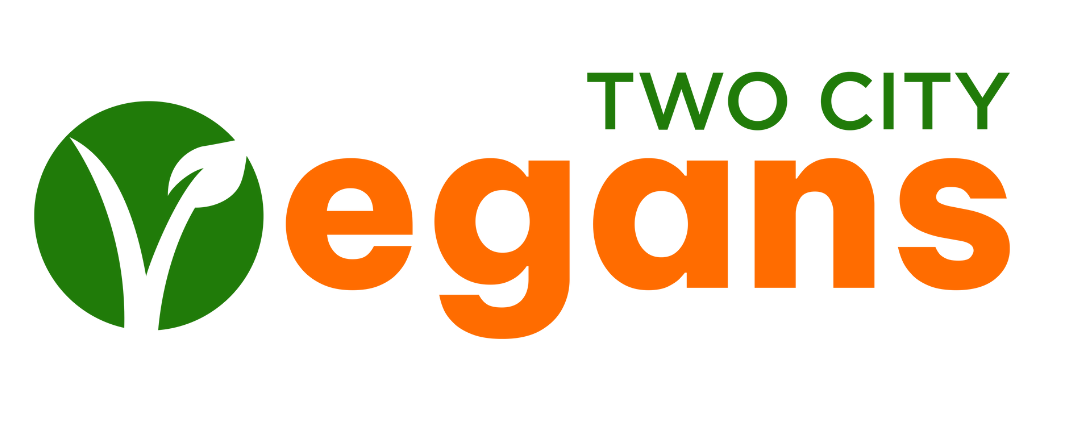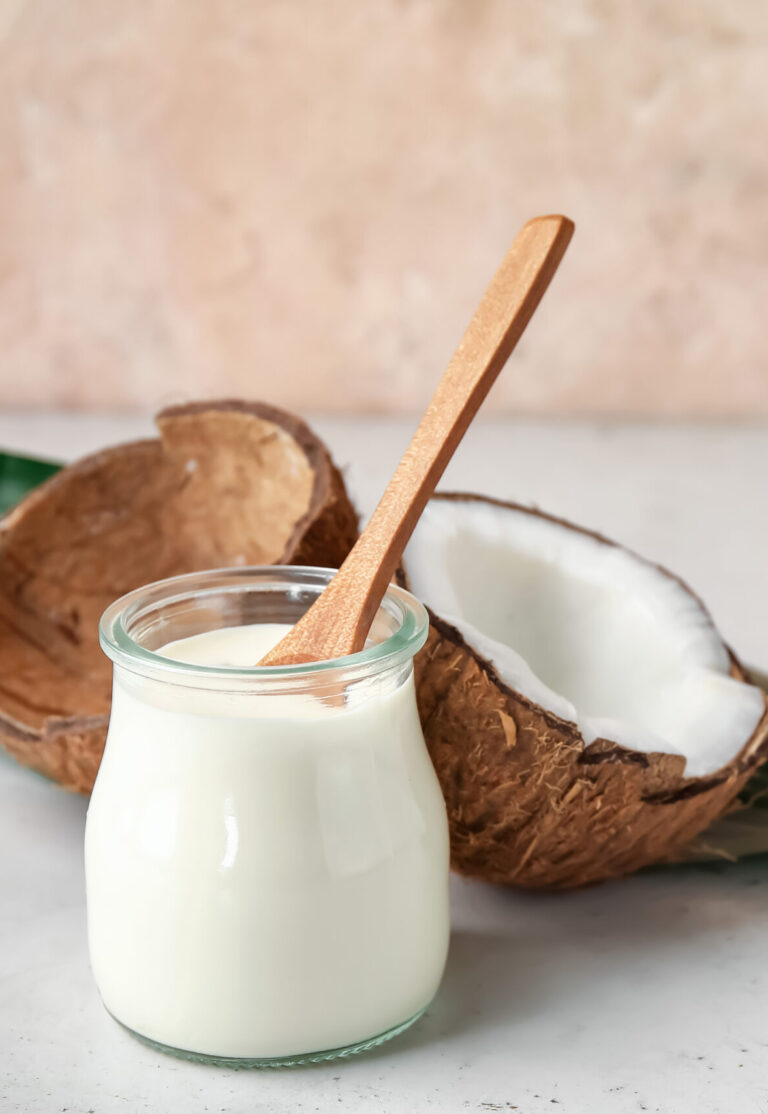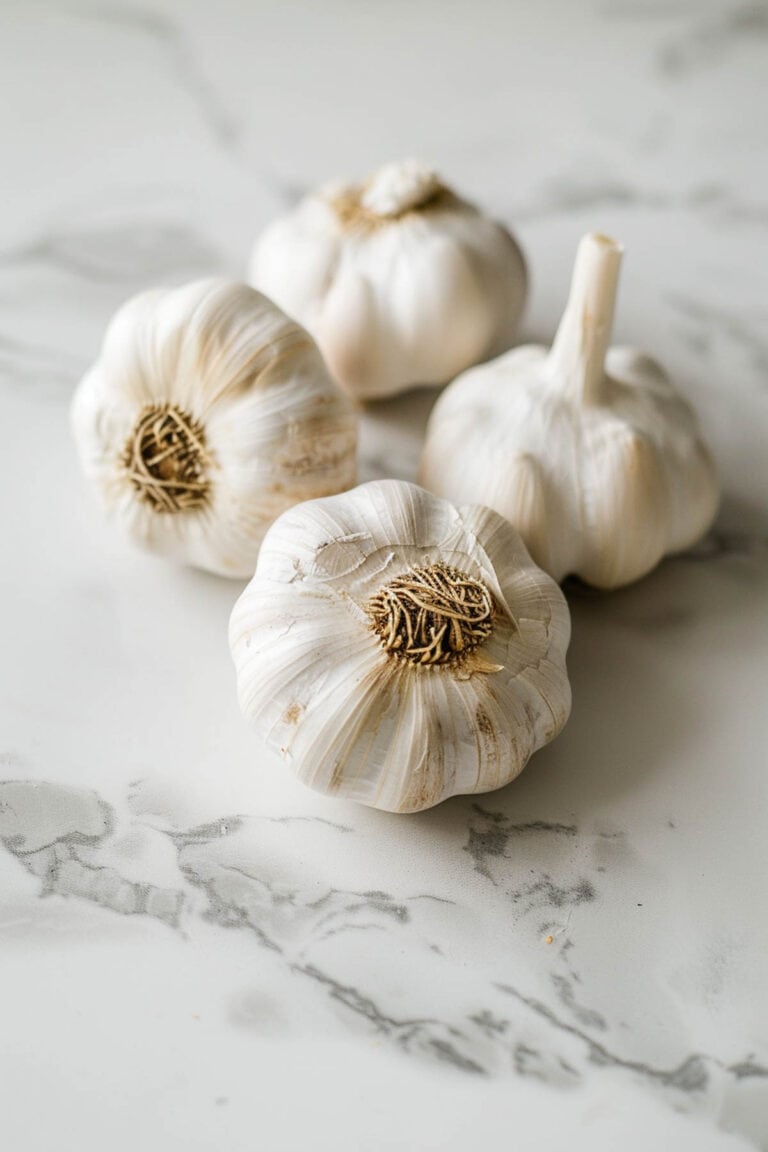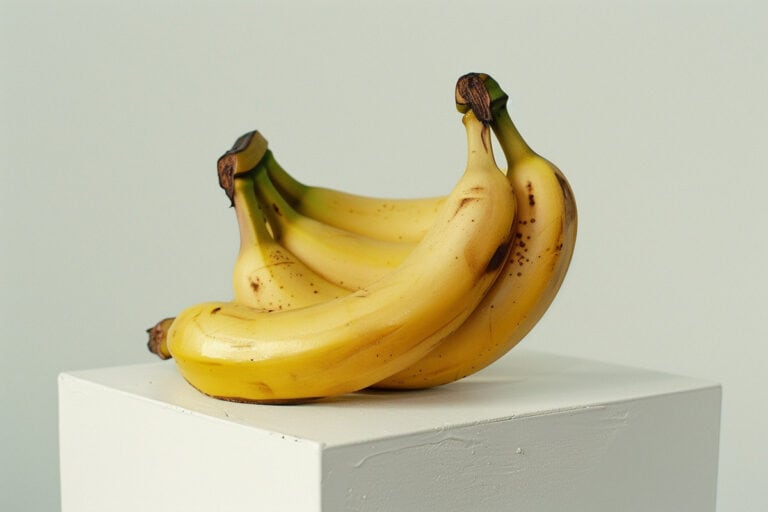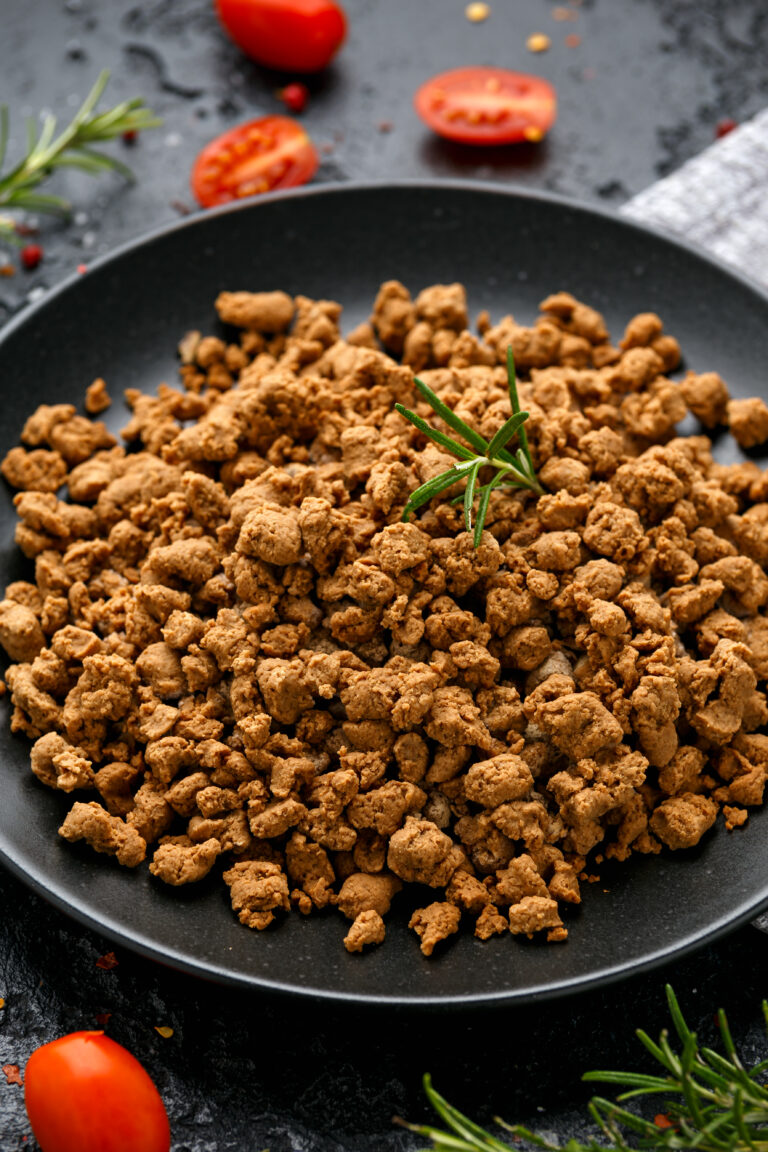Is Rice Vegan? An Overview of Vegan Rice Brands & Ethics
Rice is one of the biggest staples of a vegan or plant-based diet.
It’s filling, high in energy-releasing carbohydrates, and in its purest form, it’s even gluten-free!
Some types of rice have been shown to be great sources of protein, with studies suggesting that consuming rice may improve nervous system function and, because rice is high in fiber, even reduce the risk of cancer.
Rice makes a wholesome, starchy addition to plenty of delicious vegan meals, from stir-fries to proteinous bean chillis.
However, you may be surprised to hear that not all forms of rice are 100% vegan. This is something that even some long-term vegans are unaware of.
As a vegan, it’s important to remain mindful of the foods you are putting into your body and to be aware of which practices your money is contributing towards.
In today’s article, we’re going to be exploring the vegan statuses of all the most common types of rice out there, from white and brown rice to fried rice and even individual rice brands.
We will also be touching on the ethics of rice production and how these practices interact with veganism on a global scale.
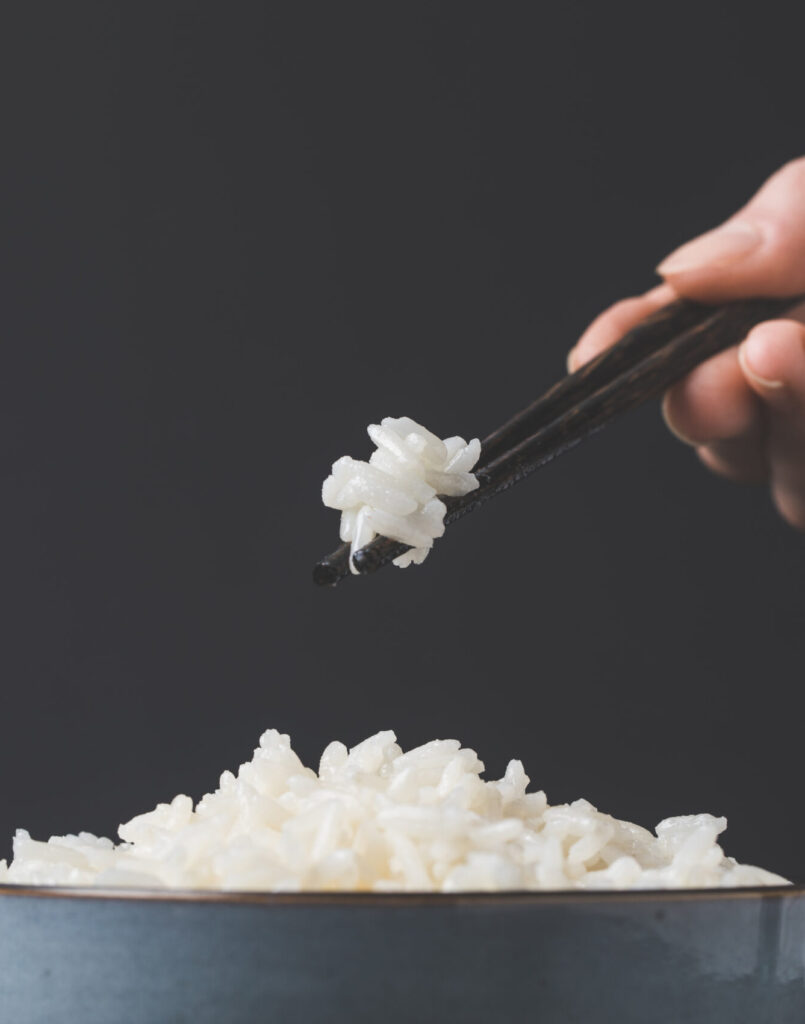
This article may contain affiliate links. See our full disclosure here.
Table of Contents
What is Rice?
We know this might seem like a question with an obvious answer, but understanding what exactly rice is and where it comes from will provide you with most of the information you need to answer the question: ‘is rice vegan?’
Each grain of rice that you consume throughout your lifetime is actually a seed. In most cases, these seeds are harvested from a plant called Oryza sativa, commonly known as ‘rice’ or ‘Asian rice.’
Other Oryza varieties from which rice seeds may be harvested include Oryza glaberrima (also known as ‘African rice’), Oryza indica, and Oryza japonica.
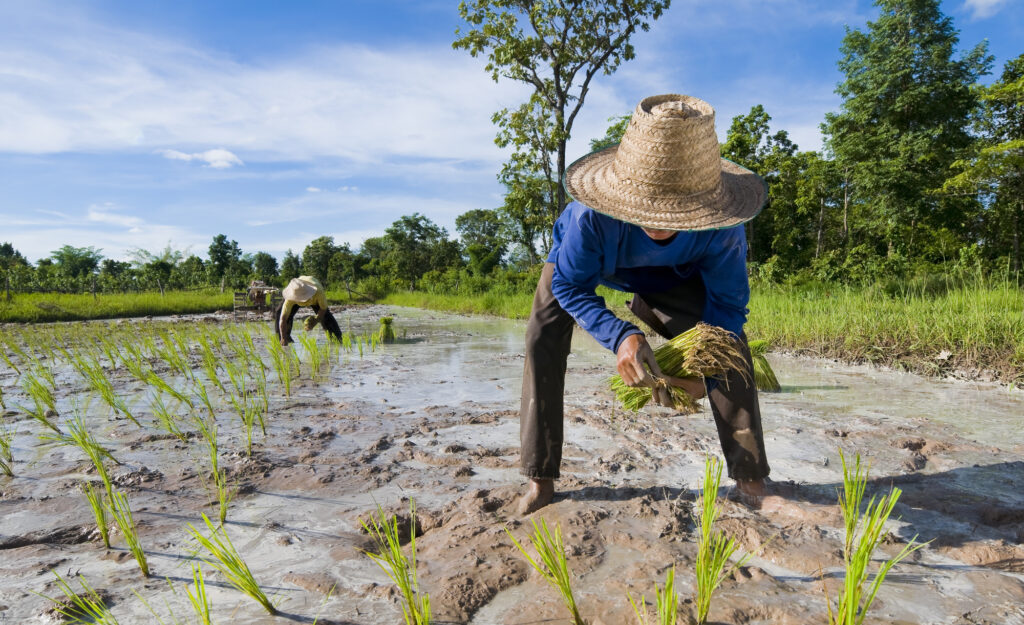
The definition of rice as the seed of the Oryza plant tells you everything you need to know about whether rice, in its natural form, is vegan. Since it’s the product of a plant, untreated, natural rice is 100% vegan in terms of ingredient content.
Confusion about the vegan status of rice can arise, however, when individual brands, recipes, harvesting, and distribution processes are taken into account, which is why articles like this one are essential for the vegan community.
Is White Rice Vegan?
White rice is one of the most widely available and widely consumed forms of rice worldwide. It’s popular for its soft texture and quick cooking times.
White rice contains less fiber (and fewer nutrients overall) than brown rice. Many vegans (especially those who have made the dietary switch to benefit their health) may see this as a disadvantage, but it also has some hidden benefits.
Vegan or plant-based diets can take many forms, the most common style of veganism involves eating plenty of fiber, complex carbohydrates, and whole foods alongside adequate amounts of protein and fat.
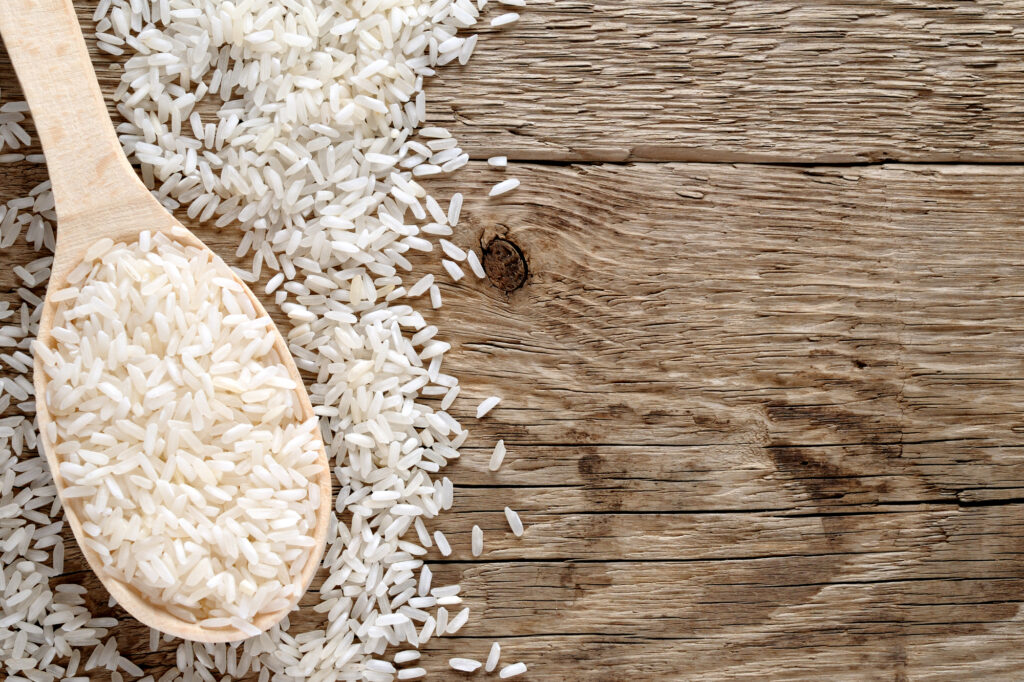
However, this type of veganism can be difficult or even ill-advised for people with low tolerance to fibrous foods.
IBS-sufferers, for example, may not be able to consume high levels of fiber in their diets without becoming ill. Other digestive issues can also make high-fiber diets a no-go.
Because white rice is one of the least fibrous forms of rice, it’s a great source of carbohydrates for individuals with fiber intolerance.
And best of all, we’re happy to confirm that plain white rice will virtually always be vegan.
Is Brown Rice Vegan?
So, we now know that white rice is vegan, but what about brown rice?
If you’re a fan of brown rice for its high nutritional value, you’ll be glad to hear that you can absolutely incorporate brown rice into a vegan diet.
Many people (vegans and non-vegans alike) find themselves wondering at some point what the difference is between white and brown rice.
Essentially, brown rice is exactly the same as white rice, except that the outer husk has been peeled off at the point of processing.
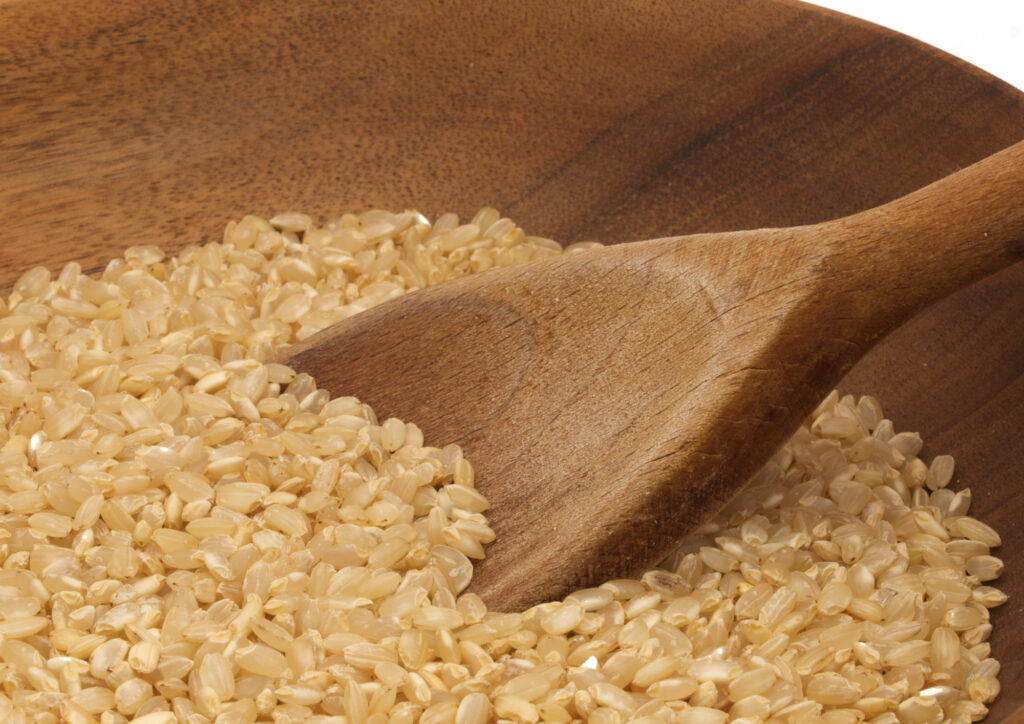
Rice husks (also known as hulls) don’t contain much nutritional value, consisting primarily of 40% cellulose, 20% silica, and 30% lignin. Therefore, removing the husk simply gets rid of unnecessary chemical compounds.
Brown rice is actually such a great source of nutrition that studies have indicated it may help to prevent heart disease!
This is because it’s so high in magnesium: an excellent heartbeat and blood pressure regulator. It also combats plaque accumulation in the arteries, which is one of the leading causes of heart disease.
So, if you’re looking for a delicious and versatile vegan food source that also promotes heart health, try incorporating more brown rice into your plant-based diet.
Is Jasmine Rice Vegan?
Jasmine rice may look very similar to traditional white rice at first glance, but they are not the same.
While white rice can refer to rice seeds with husks included in virtually any grain type (short, medium, or long), jasmine rice refers exclusively to long-grain, fragrant white rice.
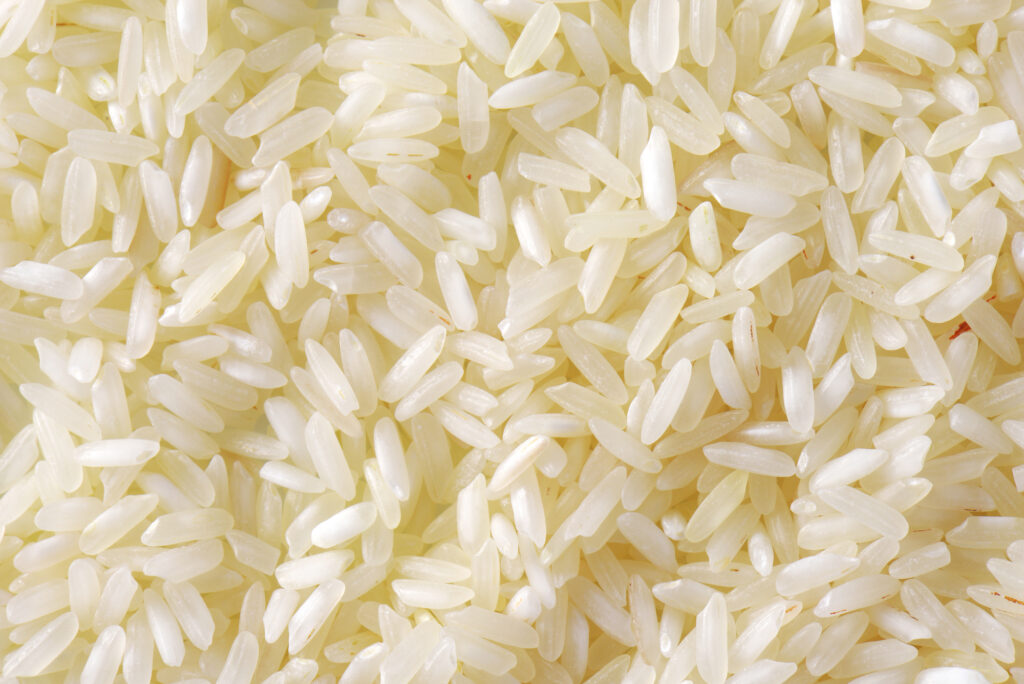
Just like white and brown rice, though, jasmine rice is 100% vegan. Additionally, studies have suggested that consuming jasmine rice may have unique health benefits! Some jasmine rice varieties contain phytonutrients, which promote healthy immune function.
It’s lower in fiber than brown rice, so it’s great for vegans who can’t tolerate fiber, and it’s even been shown to promote healthy pregnancy because of its high folic acid content.
Is Basmati Rice Vegan?
Basmati rice is another rice variety that frequently gets confused with white rice. It’s also easy to mix up with jasmine rice because they look very similar, both being long-grained rice varieties.
However, basmati rice has a softer texture than jasmine rice, and while aromatic, its smell and flavor aren’t quite so distinctive.
Basmati rice is especially delicious when seasoned with black pepper, bay leaves, or cloves, and even better, it’s completely vegan-friendly!
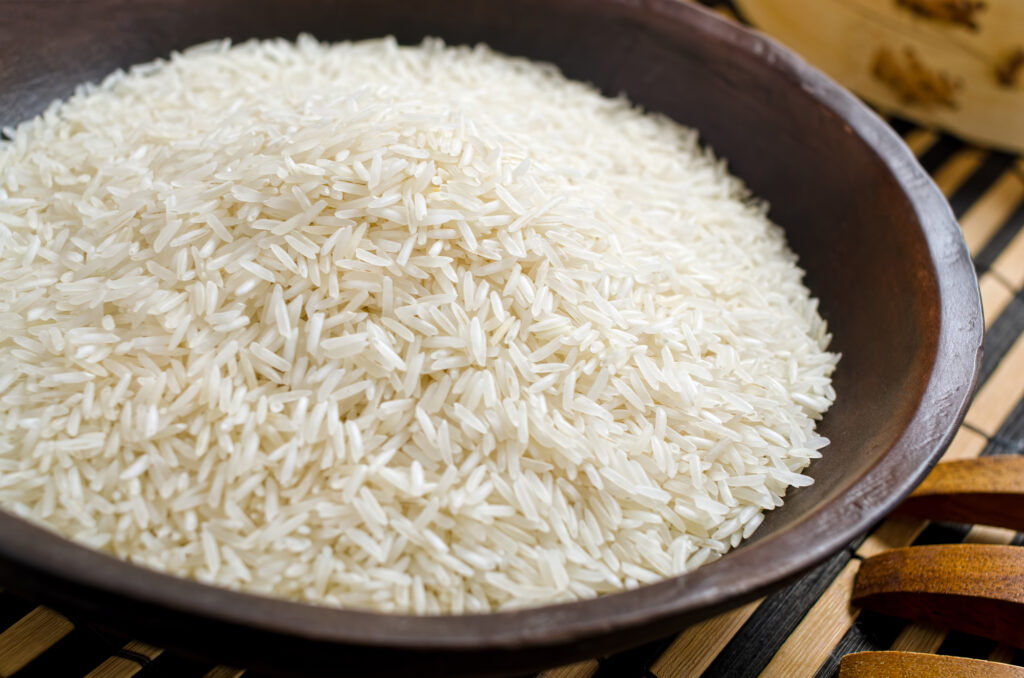
You can find basmati rice in both whole grain and white varieties, so this type of rice is very versatile. Most vegans will be able to find a type of basmati rice that works for them, regardless of dietary restrictions.
Wholegrain basmati rice is especially beneficial health-wise because it contains soluble fiber, which encourages healthy digestion and, like brown rice, it’s thought to help lower the risk of cardiovascular disease.
Is Fried Rice Vegan?
The answer to whether or not fried rice is vegan is a little more complicated than the other types of rice we’ve discussed in this article.
This is not because the rice in itself is less likely to be vegan, but because fried rice is defined as ‘stir-fried rice mixed with vegetables, meat or seafood,’ there’s a lot of room for variety.
You can make fried rice with just about any type of rice, from plain white rice to brown or jasmine rice. As we’ve already demonstrated, all of these rice types by themselves are vegan, so the rice isn’t the problem here.
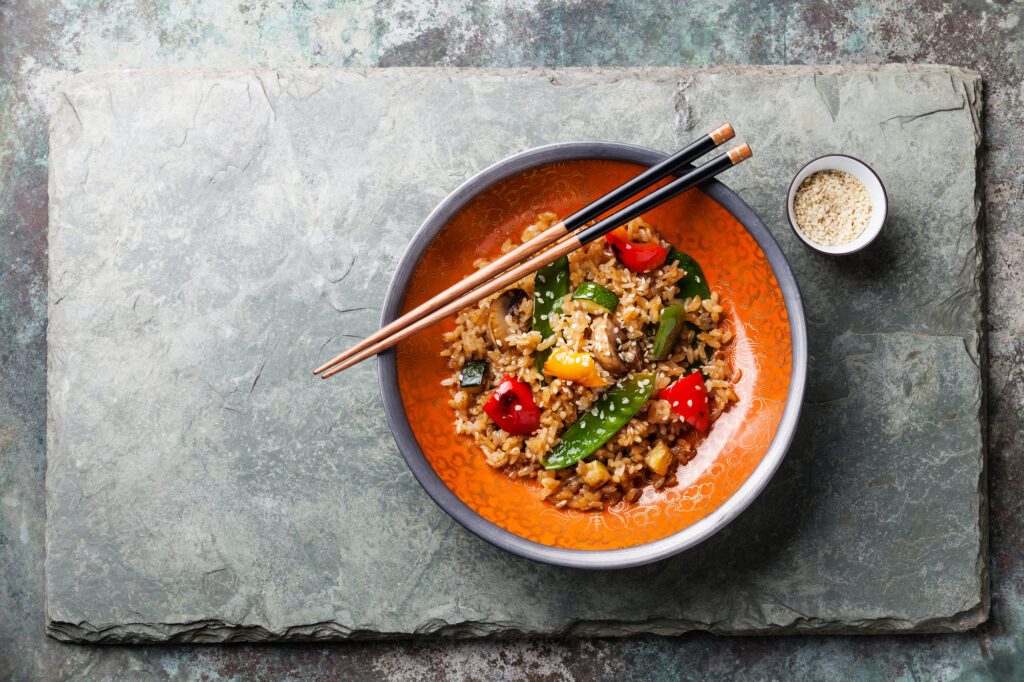
Ultimately, whether or not fried rice is vegan depends on what you fry it with. Clearly, if you mix your rice up with prawns or beef, it’s not going to be vegan anymore.
Additionally, the classic favorite of ‘egg fried rice’ is not vegan, for the obvious reasons that it contains egg, which is an animal byproduct and a major contributor to the factory farming industry.
However, you can make delicious vegan fried rice using peas, carrot, cauliflower, onion, cashew nuts… Basically, whatever plant-based delights you’re feeling on any given day!
Which Rice Brands are Vegan?
With the exception of some fried rice recipes, we have now ascertained that the vast majority of rice varieties, in their natural forms, are suitable for vegans. But what about popular storebought brands? Are these all vegan, too?
Well, the good news is that the vast majority of popular rice brands you can find at your local store are vegan.
Vegans may be put off purchasing branded rice, especially microwaveable or ‘boil in the bag’ varieties because these products often feature some unfamiliar ingredients on the labels.
However, in most cases, these are just vitamin additives intended to fortify the nutritional value of processed rice.
Popular vegan rice brands include (some, not all) products from:
- Minute Rice
- Uncle Ben’s
- Lotus Foods
- Seeds of Change
- Suma
- Bare Naked Foods
- Mr. Organic
- Merchant Gourmet
- Green City
- Nature’s Store
- Castagno Bio
Please note that while all of the above brands manufacture vegan rice products, this does not necessarily mean that each and every rice product from that brand will necessarily be vegan.
For example, Uncle Ben’s products are majority vegan, with the brand’s wholegrain brown, Spanish, red bean, original long-grain, wild long-grain, brown basmati, garden vegetable, pinto bean, and black rice varieties all being suitable for vegans.
However, other Uncle Ben’s flavors, like the beef or creamy four-cheese flavors, clearly are not vegan-friendly.

We should also note that this is by no means an exhaustive list of all the vegan-friendly rice brands in the world.
The best way to ensure that your branded rice is suitable for vegans is to read the ingredients carefully. It should be relatively easy to spot any meat or fish products this way, even if the front of the packaging is ambiguous.
Helpfully enough, most of the animal byproducts you’ll want to avoid (eggs, milk, and cheese) should be listed either in bold or separately on the packaging because eggs and dairy are common allergens. With that being said, it’s still a good idea to read the ingredients all the way through just to be safe.
You might also notice a section on the ingredients list titled ‘may contain’ or ‘may also contain.’ This simply means that the product has been processed or packaged in a facility or using equipment that may also have come into contact with the listed ingredients.
Again, this is included more for the benefit of customers with allergies because of the risk of cross-contamination.
However, some vegans prefer to boycott companies that produce non-vegan products altogether, or simply feel uncomfortable knowing that traces of dairy or egg might be in their food, so this section may be helpful in these cases.
Veganism and the Ethics of Rice Production
The question of how the ethics of rice production, harvesting, and distribution interact with the ethics of veganism is perhaps a controversial subject.
Much of this controversy arises from the fact that, contrary to popular belief, not all people who follow a vegan diet or lifestyle do so for the ethical implications.
Many people have adopted plant-based living for health reasons as opposed to moral ones.
This has led to an ongoing debate surrounding what constitutes veganism and whether the terms ‘vegan’ and ‘plant-based’ should be used interchangeably or not.
With that said, we certainly aren’t here to tell you how you should or shouldn’t identify. Making positive and proactive changes to your lifestyle is valid and praiseworthy, no matter your primary motivation or long-term goals.
Whether you’re vegan for the animals, the planet, or your health, understanding the implications of rice production from an ethical and environmental standpoint can help to broaden your understanding of the food industry as a whole and foster more sustainable food choices overall.
Water
Water consumption is possibly the main environmental issue linked to mass rice farming. 1 kilogram of rice (a large storebought bag) requires an alarming quantity of water (2,497 liters) to produce.
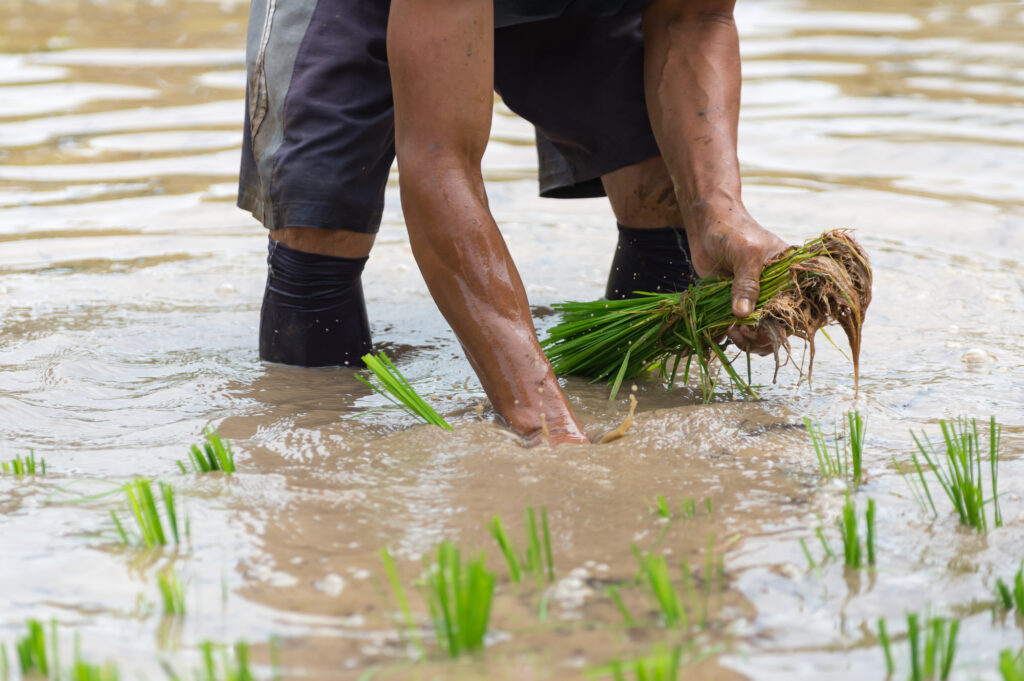
Given the fact that approximately 1.1 billion people worldwide do not have access to clean water, the huge quantities of water involved in rice production have raised questions about whether rice can truly be considered vegan.
The reason these questions are being asked is that the Vegan Society’s definition of veganism includes ‘the benefit of animals, humans, and the environment.’
Clearly, mass water consumption in the face of several water shortages worldwide seems to go directly against benefitting humans and the environment.
Greenhouse Gases
Greenhouse gas emissions are another primary concern relating to rice farming.
The transport and mass production of rice releases enormous amounts of Carbon Dioxide into the atmosphere.
For context, about 2.5% of human-caused global warming worldwide can be traced back to rice production. Based on statistics, rice is significantly more detrimental than any other crop farming, including corn, wheat, and other vegetables.
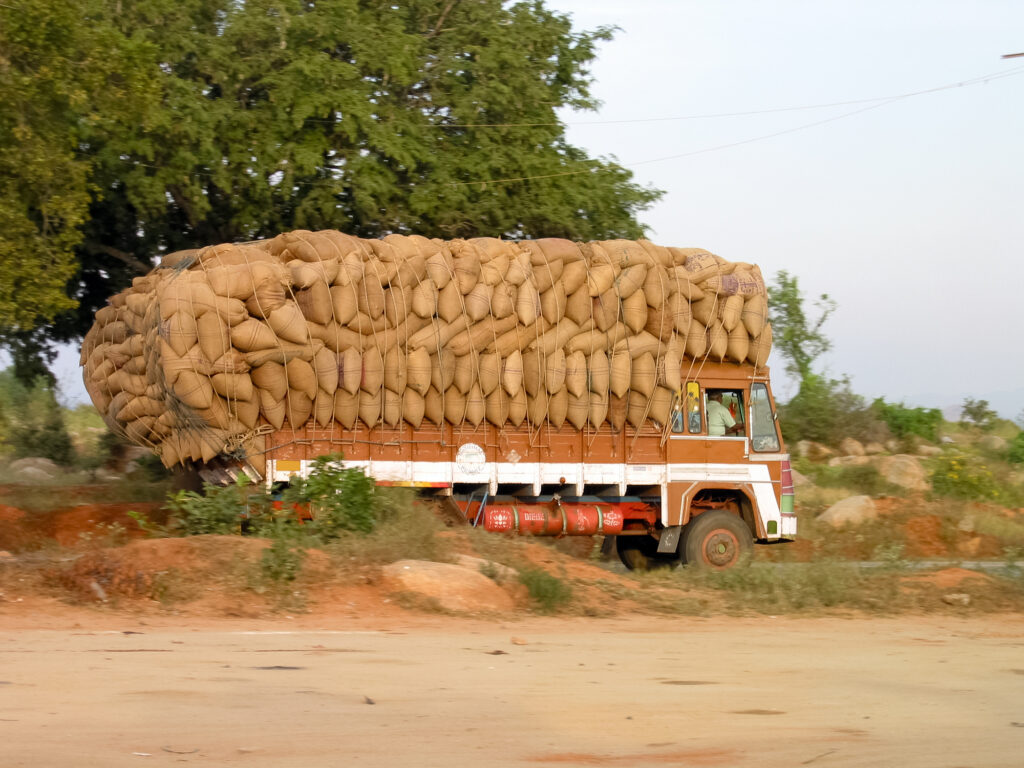
Of course, this in itself raises a lot of questions. How do we combat this problem? Is there a way of making rice farming more sustainable? Should people in Western countries limit their rice intake (and, thus, the demand for rice transportation)?
These are questions that will require a great deal of further research to answer conclusively. In the meantime, the best solution is to shop locally and seasonally wherever possible and to educate yourself on the realities of global food production.
By reading this article, you’ve already made an excellent start!
Final Thoughts
So, can vegans eat rice? In most cases, yes. Rice is a plant-based seed that makes a hearty and, often, nutritionally beneficial contribution to the average vegan diet.
The main exceptions to this are fried rice products made with dairy, eggs, seafood, or meat.
If you love your vegan fried rice, make sure to read the labels carefully before you buy. Alternatively, you could make your own vegan fried rice at home!
With that being said, it’s clear that there are further questions to be asked regarding how well rice production ties in with the Vegan Society’s definition of veganism and what more can be done to lessen its impact on communities and the environment.
